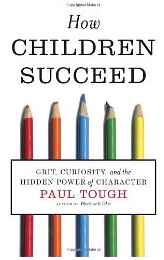I recently read “How Children Succeed: Grit, Curiosity, and the Hidden Power of Character” by Paul Tough. Here are the quotes I found most interesting. As always, if you like the quotes, please buy the book here.
 “What matters most in a child’s development, they say, is not how much information we can stuff into her brain in the first few years. What matters, instead, is whether we are able to help her develop a very different set of qualities, a list that includes persistence, self-control, curiosity, conscientiousness, grit, and self-confidence.” (xv)
“What matters most in a child’s development, they say, is not how much information we can stuff into her brain in the first few years. What matters, instead, is whether we are able to help her develop a very different set of qualities, a list that includes persistence, self-control, curiosity, conscientiousness, grit, and self-confidence.” (xv)
“It wasn’t poverty itself that was compromising the executive function abilities of the poor kids. It was the stress that went along with it.” (20)
“It was the licking-and-grooming habits of the rearing rat mother that mattered. When a pup received the comforting experience of lickign and grooming as an infant, it grew up to be braver and bolder and better adjusted than a pup who hadn’t, whether or not its biological mother was the one who had done the licking and grooming.” (30)
“It showed that, in rats at least, subtle parental behaviors had predictable and long-lasting DNA-related effects that could actually be traced and observed.” (31)
“Babies whose parents responded readily and fully to their cries in the first months of life were, at one year, more independent and intrepid than babies whose parents had ignored their cries.” (33)
“Pure IQ is stubbornly resistant to improvement after about age eight. But executive functions and the ability to handle stress and manage strong emotions can be improved, sometimes dramatically, well into adolescence and even adulthood.” (43)
“There was always this idea in America that if you worked hard and you showed real grit, that you could be successful. Strangely, we’ve now forgotten that.” (56)
“People who have an easy time of things, who get eigh hundreds on their SATs, I worry that those people get feedback that everything they’re doing is great. And I think as a result, we are actually setting them up for long-term failure. When that person suddenly has to face up to a difficult moment, then I think they’re screwed, to be honest. I don’t think they’ve grown the capacities to be able to handle that.” (57)
“Duckworth finds it useful to divide the mechanics of achievement into two separate dimensions: motivation and volition.” (64)
“A psychologist found that the test that most reliably predicted a high-school student’s future didn’t measure IQ; it measured how a student’s peers rated him on a trait Smith called “strength of character,” which included being “conscientious, responsible, insistently orderly, not prone to daydreaming, determined, persevering.” This measure was three times more successful in predicting college performance than any combination of cognitive ratings, including SAT scores and class rank.” (72)
“Regardless of the facts on the malleability of intelligence, students do much better academically if they believe intelligence is malleable.” (97)
“Most people won’t tell teenage girls (especially the together, articulate ones) that they are lazy and the quality of their work is unacceptable. And sometimes kids need to hear that, or they have no reason to step up.” (120)
“A lot of people with attention issues crave intense experiences and serious stimulations, they want to be absorbed in some sort of all-encompassing pursuit.” (130)
“When it comes to ambitions, it is crucial to distinguish between ‘wanting’ something and ‘choosing’ it. Decide that you want to become world champion, Rowson explained, and you will inevitably fail to put in the necessary hard work. You will not only not become world champion but also have the unpleasant experience of falling short of a desired goal, with all the attendant disappointment and regret. If, however, you choose to become world champion, then you will “reveal your choice through your behavior and your determination. Every action says, ‘This is who I am.’” (131)
“Standardized-test scores were predicted by scores on pure IQ tests and that GPA was predicted by scores on tests of self-control.” (153)
“Whether or not a student is able to graduate from a decent American college doesn’t necessarily have all that much to do with how smart he or she is. It has to do, instead, with that same list of character strengths that produce high GPAs in middle school and high school.” (153)
If you liked the quotes, please buy the book here.

